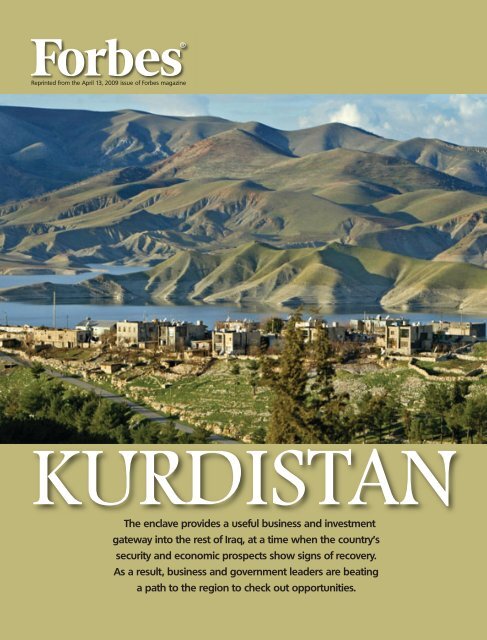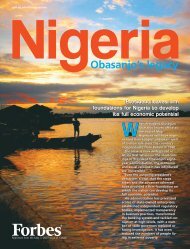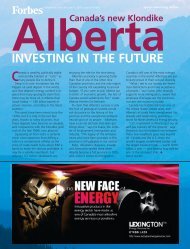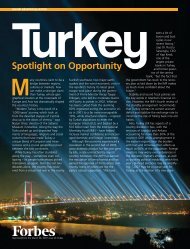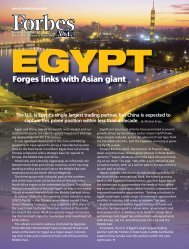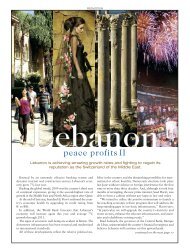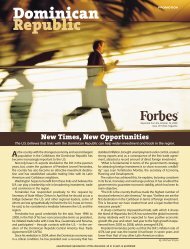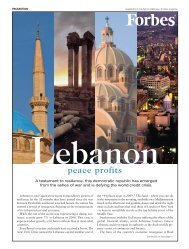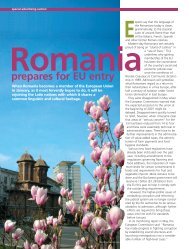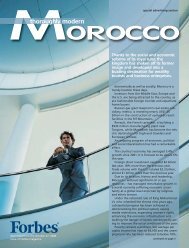Kurdistan: pdf file April, 2009 - Insight Publications
Kurdistan: pdf file April, 2009 - Insight Publications
Kurdistan: pdf file April, 2009 - Insight Publications
You also want an ePaper? Increase the reach of your titles
YUMPU automatically turns print PDFs into web optimized ePapers that Google loves.
Reprinted from the <strong>April</strong> 13, <strong>2009</strong> issue of Forbes magazine<br />
KURDISTAN<br />
The enclave provides a useful business and investment<br />
gateway into the rest of Iraq, at a time when the country’s<br />
security and economic prospects show signs of recovery.<br />
As a result, business and government leaders are beating<br />
a path to the region to check out opportunities.
FALEH KHEIBER/Reuters/Corbis<br />
1 KURDISTAN 9 PROMOTION<br />
KURDISTAN<br />
seeing is believing<br />
Once the breadbasket of Iraq, <strong>Kurdistan</strong> is emerging as a vibrant<br />
business force in the Middle East recovery process as it seeks<br />
investment to rebuild its economy.<br />
The successful staging of provincial elections<br />
in Iraq in January has provided a<br />
further boost to the economic prospects of<br />
<strong>Kurdistan</strong>, the semi-autonomous region in<br />
northeastern Iraq.<br />
Duhok<br />
The streets of Erbil, the regional capital,<br />
have been buzzing with accelerated business<br />
activity in recent months, and an increasing<br />
number of Westerners can be found mingling<br />
with the locals. Upmarket hotels and luxury<br />
housing projects are being constructed,<br />
and the city’s international airport has<br />
opened a second terminal to handle the<br />
increasing amount of passenger traffic.<br />
The reason for this increased activity is<br />
that the <strong>Kurdistan</strong> enclave provides a useful<br />
business and investment gateway into the<br />
rest of Iraq, at a time when the country’s<br />
security and economic prospects show signs<br />
of recovery. As a result, business and government<br />
leaders are beating a path to the<br />
region to check out opportunities.<br />
<strong>Kurdistan</strong> is the size of Ohio, with a population<br />
of about 5 million. A mountainous<br />
land blessed with plentiful supplies of<br />
water, the region was once the breadbasket<br />
of Iraq and has an estimated 45 billion<br />
barrels of oil.<br />
It has been a haven of peace and stability<br />
and a reliable partner for the U.S. since<br />
it achieved the current degree of self-rule<br />
in 1992. Government officials point out<br />
that not a single coalition soldier has died,<br />
nor has a single foreigner been kidnapped<br />
in <strong>Kurdistan</strong> in the past six years.<br />
The region consists of three provinces:<br />
Erbil, the regional capital and main commercial<br />
center; Duhok, which is close to the<br />
Turkish and Syrian borders; and<br />
Sulaimaniya, which hosts three universities<br />
and is also a commercial and cultural hub.<br />
Opening minds and markets<br />
Two telecom tycoons are emblematic of<br />
<strong>Kurdistan</strong>’s emerging free-market<br />
dynamism – Faruk Mustafa Rassool, chairman<br />
of Asiacell, and Serwan Mustafa,<br />
chairman and founder of Korek Telecom.<br />
Asiacell, the first mobile telecom company<br />
in Iraq, was established in the city of<br />
Sulaimaniya, while Korek was the first<br />
mobile operator in Erbil and Duhok.<br />
Asiacell is celebrating its tenth anniversary<br />
this year and has marked the occasion<br />
by announcing that its subscriber base has<br />
exceeded 6 million, a 34% market share.<br />
“Asiacell began under very difficult conditions,”<br />
recalls Rassool. The region was<br />
experiencing an economic embargo by the<br />
international community, and Rassool had<br />
to smuggle the components of the planned<br />
cellular network across the mountains into<br />
<strong>Kurdistan</strong>. “It’s a huge achievement that we<br />
Managing Editor: Beverley Blythe; Editor: Michael Knipe<br />
Art Director: Lisa Pampillonia<br />
Project Managers: Lucas Montes de Oca and<br />
Carolina Mateo<br />
This special advertising feature was produced by <strong>Insight</strong><br />
<strong>Publications</strong>, a division of Impact Media International Ltd.<br />
150 East 55th Street, 7th Floor, NY, NY 10022, USA.<br />
Tel: +1 212 751 1900 Fax: +1 212 751 0088<br />
www.insight-publications.com<br />
e-mail: publisher@insight-publications.com
are now a company with more than<br />
6 million subscribers,” he says.<br />
When Iraq was liberated by the coalition<br />
forces in 2003, Asiacell won the license for<br />
the north in an auction for the allocation<br />
of mobile telephone operations. “Of the<br />
companies competing, we were the only<br />
Iraqi company,” says Rassool. “We have<br />
reached the majority of the Iraqi areas in<br />
record time, and we are the first company<br />
to be present in all of Iraq.”<br />
In 2007, Asiacell paid $1.25 billion for<br />
the 15-year global system for mobile<br />
(GSM) license, paving the way for its<br />
expansion. “We have educated thousands<br />
of Iraqis in many new skills,” says Rassool.<br />
“We have taught them new technologies,<br />
the English language and computer skills.<br />
We have opened the market to many people<br />
and opened their minds to many<br />
aspects of modern society.”<br />
Korek Telecom has 2 million subscribers<br />
in the <strong>Kurdistan</strong> region and is in the<br />
process of setting up its network in key<br />
cities elsewhere in Iraq. “We plan to add<br />
KURDISTAN 9 PROMOTION<br />
more than 4.8 million customers to our network<br />
in the next four years,” says Serwan<br />
Mustafa. “The <strong>Kurdistan</strong> and Iraqi markets<br />
are growing tremendously, so there is a lot<br />
of ground for expansion.”<br />
When Korek was established in 2001, it<br />
had a license to operate only in the<br />
<strong>Kurdistan</strong> region but gained a countrywide<br />
license two years later when it bid $1.25 billion<br />
for one of three 15-year licenses being<br />
auctioned by the regional government.<br />
Having invested so heavily in purchasing<br />
its license, Korek is seeking a strategic part-<br />
The reason for this increased activity is that the <strong>Kurdistan</strong> enclave<br />
provides a useful business and investment gateway into the rest of Iraq.<br />
ner to assist with its future expansion plans.<br />
“We are currently in advanced negotiations<br />
with two other mobile phone providers,<br />
Turkcell from Turkey and Etisalat of the<br />
United Arab Emirates,” says Mustafa.<br />
He points out that while in most parts of<br />
the world telecom markets are saturated<br />
with companies needing to take customers<br />
from each other, Iraq is a greenfield site.<br />
“We have a potential market of 28 million<br />
users, and only a third of them use mobile<br />
phones. It is a great opportunity for Korek.”<br />
Fundamentals for growth<br />
<strong>Kurdistan</strong>’s problems stem from its time<br />
under Saddam Hussein. More than 4,500<br />
villages were destroyed, and the economy<br />
was starved of investment. Today, under the<br />
leadership of Masoud Barzani, the regional<br />
president, and Nechirvan Barzani, the prime<br />
minister, the government is rebuilding infrastructure<br />
and improving administrative<br />
transparency.<br />
The government believes <strong>Kurdistan</strong> has<br />
a level of stability and security that provides<br />
a huge competitive advantage, but needs<br />
foreign investors with their knowledge<br />
and know-how to jump-start the economy.<br />
The region has an investment law that<br />
provides many benefits, including security<br />
and land and tax exemptions, and there are<br />
no limitations on the amount of capital that<br />
investors can transfer out of <strong>Kurdistan</strong>.<br />
The immediate priorities are to ensure<br />
that everyone has proper basic services such<br />
as housing, roads, electricity and water, says<br />
Othman Shwani, the minister of planning.<br />
“We know how important it is to lay<br />
down the fundamentals first in order to<br />
have strong, dynamic and sustainable<br />
growth in the future.” ❖<br />
2
<strong>Insight</strong><br />
P u b l i c a t i o n s<br />
a division of Impact Media International Ltd.<br />
150 East 55th Street, 7th Floor, NY, NY 10022, USA.<br />
Tel: +1 212 751 1900 Fax: +1 212 751 0088<br />
www.insight-publications.com


